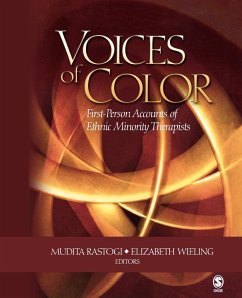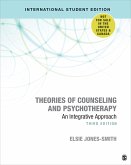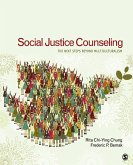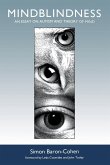Mudita Rastogi / Liz WielingFirst-Person Accounts of Ethnic Minority Therapists
Voices of Color
First-Person Accounts of Ethnic Minority Therapists
Herausgeber: Rastogi, Mudita; Wieling, Elizabeth
Mudita Rastogi / Liz WielingFirst-Person Accounts of Ethnic Minority Therapists
Voices of Color
First-Person Accounts of Ethnic Minority Therapists
Herausgeber: Rastogi, Mudita; Wieling, Elizabeth
- Broschiertes Buch
- Merkliste
- Auf die Merkliste
- Bewerten Bewerten
- Teilen
- Produkt teilen
- Produkterinnerung
- Produkterinnerung
Using real cases, narratives, and biographical material, this text examines issues related to the mental health intersect with race and ethnicity. It draws on the experiences of ethnic minority therapists.
Andere Kunden interessierten sich auch für
![Psychotherapy and the Quest for Happiness Psychotherapy and the Quest for Happiness]() Emmy van DeurzenPsychotherapy and the Quest for Happiness68,99 €
Emmy van DeurzenPsychotherapy and the Quest for Happiness68,99 €![Theories of Counseling and Psychotherapy - International Student Edition Theories of Counseling and Psychotherapy - International Student Edition]() Elsie Jones-SmithTheories of Counseling and Psychotherapy - International Student Edition198,99 €
Elsie Jones-SmithTheories of Counseling and Psychotherapy - International Student Edition198,99 €![Social Justice Counseling Social Justice Counseling]() Rita Chi-Ying ChungSocial Justice Counseling105,99 €
Rita Chi-Ying ChungSocial Justice Counseling105,99 €![Dance Movement Therapy Dance Movement Therapy]() Bonnie MeekumsDance Movement Therapy190,99 €
Bonnie MeekumsDance Movement Therapy190,99 €![The Ethical Use of Touch in Psychotherapy The Ethical Use of Touch in Psychotherapy]() Michael G. HunterThe Ethical Use of Touch in Psychotherapy105,99 €
Michael G. HunterThe Ethical Use of Touch in Psychotherapy105,99 €![Mindblindness Mindblindness]() Simon Baron-Cohen (Camb Professor of Developmental PsychopathologyMindblindness34,99 €
Simon Baron-Cohen (Camb Professor of Developmental PsychopathologyMindblindness34,99 €![Contemporary Voices on Individuation Contemporary Voices on Individuation]() Contemporary Voices on Individuation42,99 €
Contemporary Voices on Individuation42,99 €-
-
-
Using real cases, narratives, and biographical material, this text examines issues related to the mental health intersect with race and ethnicity. It draws on the experiences of ethnic minority therapists.
Hinweis: Dieser Artikel kann nur an eine deutsche Lieferadresse ausgeliefert werden.
Hinweis: Dieser Artikel kann nur an eine deutsche Lieferadresse ausgeliefert werden.
Produktdetails
- Produktdetails
- Verlag: SAGE Publications Inc
- Seitenzahl: 400
- Erscheinungstermin: 1. Juni 2004
- Englisch
- Abmessung: 235mm x 191mm x 21mm
- Gewicht: 752g
- ISBN-13: 9780761928904
- ISBN-10: 0761928901
- Artikelnr.: 21699042
- Herstellerkennzeichnung
- Libri GmbH
- Europaallee 1
- 36244 Bad Hersfeld
- gpsr@libri.de
- Verlag: SAGE Publications Inc
- Seitenzahl: 400
- Erscheinungstermin: 1. Juni 2004
- Englisch
- Abmessung: 235mm x 191mm x 21mm
- Gewicht: 752g
- ISBN-13: 9780761928904
- ISBN-10: 0761928901
- Artikelnr.: 21699042
- Herstellerkennzeichnung
- Libri GmbH
- Europaallee 1
- 36244 Bad Hersfeld
- gpsr@libri.de
Mudita Rastogi, Ph.D., is an Associate Professor at the Illinois School of Professional Psychology, Argosy University, Chicago, and is in private practice in Arlington Heights, Illinois. She obtained her Ph.D. in Marriage and Family Therapy from Texas Tech University, and her Master's degree, in Psychology, from University of Bombay. Dr. Rastogi is a Licensed Marriage and Family Therapist, a Clinical Member of AAMFT, and an Approved Supervisor. She has published in the areas of family and couple therapy, cross-cultural and gender issues, intergenerational relationships, practice issues and South Asian families. Her clinical interests also include adolescents, domestic violence, trauma, and EMDR. Dr. Rastogi serves on the editorial boards of Journal of Marital and Family Therapy and Journal of Systemic Therapies. She frequently presents workshops nationally and internationally. Dr. Rastogi has over fifteen years of clinical experience in both India and the United States with a highly diverse client population. She also maintains an interest in partnering with grassroots, not-for-profit organizations.
Elizabeth Wieling, Ph.D. Research interests involve the development of culturally sensitive and effective clinical interventions, cross-cultural therapy and supervision, inter-cultural couple relationships, and issues related to the status of women, including their mental health, family relationships, education, economic well-being, and political influence in the United States and abroad. I am currently investigating the cultural adaptation processes involved in modifying an evidence based parenting treatment program to better fit the cultural characteristics of a sample of at-risk Latina single mothers and children. Specifically, I am analyzing the Parenting Through Change parenting intervention developed at the Oregon Social Learning Center for its cultural relevance using an Ecological Cultural Model. I am examining the dimensions and specific cultural processes to be modified and integrated into the culturally adapted intervention, which will be manualized for later implementation. Experimental groups comprised of the standard and culturally adapted parenting interventions will be implemented to further understand issues related to study effectiveness and efficacy with this population. This study is being conducted as part of a 5-year Career Development Award funded by the National Institute on Mental Health.
Elizabeth Wieling, Ph.D. Research interests involve the development of culturally sensitive and effective clinical interventions, cross-cultural therapy and supervision, inter-cultural couple relationships, and issues related to the status of women, including their mental health, family relationships, education, economic well-being, and political influence in the United States and abroad. I am currently investigating the cultural adaptation processes involved in modifying an evidence based parenting treatment program to better fit the cultural characteristics of a sample of at-risk Latina single mothers and children. Specifically, I am analyzing the Parenting Through Change parenting intervention developed at the Oregon Social Learning Center for its cultural relevance using an Ecological Cultural Model. I am examining the dimensions and specific cultural processes to be modified and integrated into the culturally adapted intervention, which will be manualized for later implementation. Experimental groups comprised of the standard and culturally adapted parenting interventions will be implemented to further understand issues related to study effectiveness and efficacy with this population. This study is being conducted as part of a 5-year Career Development Award funded by the National Institute on Mental Health.
Chapter 1: Introduction - Mudita Rastogi and Elizabeth Wieling
Section I: Identity and Professional Development of Therapists of Color
Chapter 2: Emerging Identity: An Asian Indian Female Psychologist¿s
Perspective - Monika Sharma
Chapter 3: Our Stories: Convergence of the Language, Professional, and
Personal Identities of Three Latino Therapists - Luis Antonio Rivas, Edward
A. Delgado-Romero, and Kelly Ramon Ozambela
Chapter 4: When Turtle Met Rabbit: Native Family Systems - Janet M. Derrick
Section II: Ethnicity and Race in the Therapy Room and in the Classroom
Chapter 5: African American Women in Client, Therapist, and Supervisory
Relationships: The Parallel Processes of Race, Culture, and Family -
Shalonda Kelly and Nancy Boyd-Franklin
Chapter 6: Taking Off the Mask: Breaking the Silence--The Art of Naming
Racism in the Therapy Room - Larry Lee
Chapter 7: When Racism Is Reversed: Therapists of Color Speak About Their
Experiences With Racism From Clients, Supervisees, and Supervisors - Saba
Rasheed Ali, Jonathan R. Flojo, Krista M. Chronister, Diane Hayashino,
Quincy R. Smiling, Danielle Torres, and Ellen Hawley McWhirter
Chapter 8: Toward a Liberation Pedagogy: Creating a Safe Environment for
Diversity Conversations in the Classroom - Debra A. Nixon
Chapter 9: Post 9/11: Combating Racism in the Sanctity of Healing--A
Clinical Vignette Utilizing a Cultural Process Dialogue - Azmaira H. Maker
Chapter 10: Stories From Urban and Rural Landscapes: The Development of a
Cultural Identity - Laurie L. Charles
Chapter 11: The Process of Integrating Language, Context, and Meaning: The
Voices of Bilingual and Bicultural Therapists - Carmen Aguirre, J. Maria
Bermudez, J. Ruben Parra Cardona, Jorge Antonio Zamora, and Nenetzin
Angelica Reyes
Chapter 12: International Academic Sojourners in the United States of
America: Color in the Ivory Tower - Mudita Rastogi and Carole Woolford-Hunt
Section III: Theory- and Research-Based Interventions and Approaches
Chapter 13: South Asians in the United States: Developing a Systemic and
Empirically Based Mental Health Assessment Model - Azmaira H. Maker, Mona
Mittal, and Mudita Rastogi
Chapter 14: Black Women Victims and Perpetrators of Family Domestic
Violence: A Therapeutic Model Incorporating Racism and Black History -
Denise D. McAdory
Chapter 15: From Polarization to Pluralization: The Japanese Sense of Self
and Bowen Theory - Narumi Taniguchi
Chapter 16: Kum Ba Yah: The Relevance of Family Systems Theory for
Clinicians and Clients of African Descent - Martha Adams Sullivan
Chapter 17: Family Therapy From a Hindu Indian Worldview - Nithyakala
Karuppaswamy and Rajeswari Natrajan
Chapter 18: Developing Culturally Appropriate, Evidence Based Treatments
for Interventions With Ethnic Minority Populations - Melanie Domenech
Rodriguez and Elizabeth Wieling
Chapter 19: Acculturation Versus Cultural Identity: The Need for New
Cultural Lenses in the Mental Health Professions - J. Ruben Parra Cardona,
Richard S. Wampler, and Dean M. Busby
Index
Section I: Identity and Professional Development of Therapists of Color
Chapter 2: Emerging Identity: An Asian Indian Female Psychologist¿s
Perspective - Monika Sharma
Chapter 3: Our Stories: Convergence of the Language, Professional, and
Personal Identities of Three Latino Therapists - Luis Antonio Rivas, Edward
A. Delgado-Romero, and Kelly Ramon Ozambela
Chapter 4: When Turtle Met Rabbit: Native Family Systems - Janet M. Derrick
Section II: Ethnicity and Race in the Therapy Room and in the Classroom
Chapter 5: African American Women in Client, Therapist, and Supervisory
Relationships: The Parallel Processes of Race, Culture, and Family -
Shalonda Kelly and Nancy Boyd-Franklin
Chapter 6: Taking Off the Mask: Breaking the Silence--The Art of Naming
Racism in the Therapy Room - Larry Lee
Chapter 7: When Racism Is Reversed: Therapists of Color Speak About Their
Experiences With Racism From Clients, Supervisees, and Supervisors - Saba
Rasheed Ali, Jonathan R. Flojo, Krista M. Chronister, Diane Hayashino,
Quincy R. Smiling, Danielle Torres, and Ellen Hawley McWhirter
Chapter 8: Toward a Liberation Pedagogy: Creating a Safe Environment for
Diversity Conversations in the Classroom - Debra A. Nixon
Chapter 9: Post 9/11: Combating Racism in the Sanctity of Healing--A
Clinical Vignette Utilizing a Cultural Process Dialogue - Azmaira H. Maker
Chapter 10: Stories From Urban and Rural Landscapes: The Development of a
Cultural Identity - Laurie L. Charles
Chapter 11: The Process of Integrating Language, Context, and Meaning: The
Voices of Bilingual and Bicultural Therapists - Carmen Aguirre, J. Maria
Bermudez, J. Ruben Parra Cardona, Jorge Antonio Zamora, and Nenetzin
Angelica Reyes
Chapter 12: International Academic Sojourners in the United States of
America: Color in the Ivory Tower - Mudita Rastogi and Carole Woolford-Hunt
Section III: Theory- and Research-Based Interventions and Approaches
Chapter 13: South Asians in the United States: Developing a Systemic and
Empirically Based Mental Health Assessment Model - Azmaira H. Maker, Mona
Mittal, and Mudita Rastogi
Chapter 14: Black Women Victims and Perpetrators of Family Domestic
Violence: A Therapeutic Model Incorporating Racism and Black History -
Denise D. McAdory
Chapter 15: From Polarization to Pluralization: The Japanese Sense of Self
and Bowen Theory - Narumi Taniguchi
Chapter 16: Kum Ba Yah: The Relevance of Family Systems Theory for
Clinicians and Clients of African Descent - Martha Adams Sullivan
Chapter 17: Family Therapy From a Hindu Indian Worldview - Nithyakala
Karuppaswamy and Rajeswari Natrajan
Chapter 18: Developing Culturally Appropriate, Evidence Based Treatments
for Interventions With Ethnic Minority Populations - Melanie Domenech
Rodriguez and Elizabeth Wieling
Chapter 19: Acculturation Versus Cultural Identity: The Need for New
Cultural Lenses in the Mental Health Professions - J. Ruben Parra Cardona,
Richard S. Wampler, and Dean M. Busby
Index
Chapter 1: Introduction - Mudita Rastogi and Elizabeth Wieling
Section I: Identity and Professional Development of Therapists of Color
Chapter 2: Emerging Identity: An Asian Indian Female Psychologist¿s
Perspective - Monika Sharma
Chapter 3: Our Stories: Convergence of the Language, Professional, and
Personal Identities of Three Latino Therapists - Luis Antonio Rivas, Edward
A. Delgado-Romero, and Kelly Ramon Ozambela
Chapter 4: When Turtle Met Rabbit: Native Family Systems - Janet M. Derrick
Section II: Ethnicity and Race in the Therapy Room and in the Classroom
Chapter 5: African American Women in Client, Therapist, and Supervisory
Relationships: The Parallel Processes of Race, Culture, and Family -
Shalonda Kelly and Nancy Boyd-Franklin
Chapter 6: Taking Off the Mask: Breaking the Silence--The Art of Naming
Racism in the Therapy Room - Larry Lee
Chapter 7: When Racism Is Reversed: Therapists of Color Speak About Their
Experiences With Racism From Clients, Supervisees, and Supervisors - Saba
Rasheed Ali, Jonathan R. Flojo, Krista M. Chronister, Diane Hayashino,
Quincy R. Smiling, Danielle Torres, and Ellen Hawley McWhirter
Chapter 8: Toward a Liberation Pedagogy: Creating a Safe Environment for
Diversity Conversations in the Classroom - Debra A. Nixon
Chapter 9: Post 9/11: Combating Racism in the Sanctity of Healing--A
Clinical Vignette Utilizing a Cultural Process Dialogue - Azmaira H. Maker
Chapter 10: Stories From Urban and Rural Landscapes: The Development of a
Cultural Identity - Laurie L. Charles
Chapter 11: The Process of Integrating Language, Context, and Meaning: The
Voices of Bilingual and Bicultural Therapists - Carmen Aguirre, J. Maria
Bermudez, J. Ruben Parra Cardona, Jorge Antonio Zamora, and Nenetzin
Angelica Reyes
Chapter 12: International Academic Sojourners in the United States of
America: Color in the Ivory Tower - Mudita Rastogi and Carole Woolford-Hunt
Section III: Theory- and Research-Based Interventions and Approaches
Chapter 13: South Asians in the United States: Developing a Systemic and
Empirically Based Mental Health Assessment Model - Azmaira H. Maker, Mona
Mittal, and Mudita Rastogi
Chapter 14: Black Women Victims and Perpetrators of Family Domestic
Violence: A Therapeutic Model Incorporating Racism and Black History -
Denise D. McAdory
Chapter 15: From Polarization to Pluralization: The Japanese Sense of Self
and Bowen Theory - Narumi Taniguchi
Chapter 16: Kum Ba Yah: The Relevance of Family Systems Theory for
Clinicians and Clients of African Descent - Martha Adams Sullivan
Chapter 17: Family Therapy From a Hindu Indian Worldview - Nithyakala
Karuppaswamy and Rajeswari Natrajan
Chapter 18: Developing Culturally Appropriate, Evidence Based Treatments
for Interventions With Ethnic Minority Populations - Melanie Domenech
Rodriguez and Elizabeth Wieling
Chapter 19: Acculturation Versus Cultural Identity: The Need for New
Cultural Lenses in the Mental Health Professions - J. Ruben Parra Cardona,
Richard S. Wampler, and Dean M. Busby
Index
Section I: Identity and Professional Development of Therapists of Color
Chapter 2: Emerging Identity: An Asian Indian Female Psychologist¿s
Perspective - Monika Sharma
Chapter 3: Our Stories: Convergence of the Language, Professional, and
Personal Identities of Three Latino Therapists - Luis Antonio Rivas, Edward
A. Delgado-Romero, and Kelly Ramon Ozambela
Chapter 4: When Turtle Met Rabbit: Native Family Systems - Janet M. Derrick
Section II: Ethnicity and Race in the Therapy Room and in the Classroom
Chapter 5: African American Women in Client, Therapist, and Supervisory
Relationships: The Parallel Processes of Race, Culture, and Family -
Shalonda Kelly and Nancy Boyd-Franklin
Chapter 6: Taking Off the Mask: Breaking the Silence--The Art of Naming
Racism in the Therapy Room - Larry Lee
Chapter 7: When Racism Is Reversed: Therapists of Color Speak About Their
Experiences With Racism From Clients, Supervisees, and Supervisors - Saba
Rasheed Ali, Jonathan R. Flojo, Krista M. Chronister, Diane Hayashino,
Quincy R. Smiling, Danielle Torres, and Ellen Hawley McWhirter
Chapter 8: Toward a Liberation Pedagogy: Creating a Safe Environment for
Diversity Conversations in the Classroom - Debra A. Nixon
Chapter 9: Post 9/11: Combating Racism in the Sanctity of Healing--A
Clinical Vignette Utilizing a Cultural Process Dialogue - Azmaira H. Maker
Chapter 10: Stories From Urban and Rural Landscapes: The Development of a
Cultural Identity - Laurie L. Charles
Chapter 11: The Process of Integrating Language, Context, and Meaning: The
Voices of Bilingual and Bicultural Therapists - Carmen Aguirre, J. Maria
Bermudez, J. Ruben Parra Cardona, Jorge Antonio Zamora, and Nenetzin
Angelica Reyes
Chapter 12: International Academic Sojourners in the United States of
America: Color in the Ivory Tower - Mudita Rastogi and Carole Woolford-Hunt
Section III: Theory- and Research-Based Interventions and Approaches
Chapter 13: South Asians in the United States: Developing a Systemic and
Empirically Based Mental Health Assessment Model - Azmaira H. Maker, Mona
Mittal, and Mudita Rastogi
Chapter 14: Black Women Victims and Perpetrators of Family Domestic
Violence: A Therapeutic Model Incorporating Racism and Black History -
Denise D. McAdory
Chapter 15: From Polarization to Pluralization: The Japanese Sense of Self
and Bowen Theory - Narumi Taniguchi
Chapter 16: Kum Ba Yah: The Relevance of Family Systems Theory for
Clinicians and Clients of African Descent - Martha Adams Sullivan
Chapter 17: Family Therapy From a Hindu Indian Worldview - Nithyakala
Karuppaswamy and Rajeswari Natrajan
Chapter 18: Developing Culturally Appropriate, Evidence Based Treatments
for Interventions With Ethnic Minority Populations - Melanie Domenech
Rodriguez and Elizabeth Wieling
Chapter 19: Acculturation Versus Cultural Identity: The Need for New
Cultural Lenses in the Mental Health Professions - J. Ruben Parra Cardona,
Richard S. Wampler, and Dean M. Busby
Index








